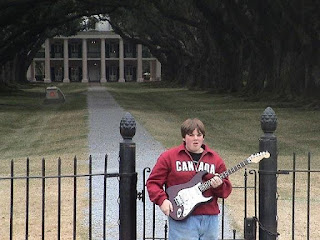Anyway, after my last post and seeing Gone With The Wind, I decided to research some more. I found this fascinating article: http://catholicism.org/catholicism-south.html
I thought it was fascinating as one of the topics I write and speak on in History as much as possible is the Anglo-American tradition of Anti-Catholicism. Just last week I wrote a paper on the Oxford Movement/Anglo-Catholicism though and until I read this article I didn't know how High Church the Episcopalians became in the 1840s. This heavily influenced many in the South. I also didn't know how many Catholic religious there were down there, even Jefferson Davis and his kids were educated by Catholics (and apparently he tried to convert when he was 9).
Well, all the interesting stuff is in the article, I just thought I'd share it.
This is possibly the ugliest picture ever taken of a human being. Joseph Merrick probably looks at this when he feels bad. Anyway it's me at 16 infront of Oak Alley Plantation:

